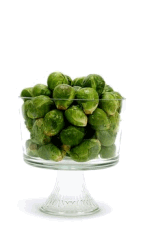The Remarkable Anti-Toxin, Cancer-Fighting Power of Cruciferous Vegetables
by www.SixWise.com
While cruciferous vegetables--broccoli, cauliflower, Brussels
sprouts, cabbage, collard greens and more--may be top on the
list of veggies kids loathe, when it comes to nutrition, these
vegetables are definitely on the A-list.
What makes them so incredibly healthy is their potent cancer-fighting
compounds, which help detoxify carcinogens in the body and
may prevent healthy cells from morphing into cancerous ones.
|

Not a fan of this cruciferous vegetable? Check out
the tips at the end of this article.
|
More Crucifers Please
The health benefits of these vegetables seem to have been
known for some time. Around 234-149 BC, Cato the Elder, a
Roman statesman, wrote a treatise on medicine that included
the following insight:
"If a cancerous ulcer appears upon the breasts, apply
a crushed cabbage leaf and it will make it well."
If cabbage isn't your favorite, don't worry. There are many
other cruciferous vegetables out there, and one's bound to
taste good to you. Today these vegetables have been found
to combat cancer of the of breast, endometrium, lung, colon,
liver, colon and cervix, and include:
- Broccoli
- Brussels sprouts
- Cabbage
- Cauliflower
- Collard greens
- Kale
- Kohlrabi
- Mustard greens
- Rutabaga
|
- Turnips
- Bok choy
- Chinese cabbage
- Arugula
- Horseradish
- Radishes
- Daikon
- Wasabi
- Watercress
|
|
Healthy Compounds Worth Noticing
|

Crucifers like cabbage may contain at least a dozen
health-promoting compounds.
|
There are at least a dozen compounds in broccoli and other
cruciferous vegetables that have peaked scientists' interest.
Most recently, researchers isolated phytochemicals called
glucosinolates from broccoli sprouts. When chopped, chewed
and digested, these compounds change into isothiocyanates,
which are powerful compounds that may inhibit cancer.
In a study by Ohio State University researchers, the isothiocyanates
were able to stop cancer cells from spreading in two human
bladder cancer cell lines and one mouse cell line. What's
more, the compounds had the greatest effect on the most aggressive
of the cancers.
"While young sprouts naturally have higher concentrations
of these phytochemicals than full-grown broccoli spears, eating
the spears also provides health benefits," said Steven
Schwartz, a study co-author and a professor of food science
and technology at Ohio State University.
FYI: One tablespoon of broccoli sprouts has as much beneficial
sulforaphane (see below) as one pound of full-grown broccoli.
Other compounds that may be responsible for the cancer-fighting
effects of cruciferous vegetables include:
-
Indole-3-carbinol: A glucosinolate that's formed
when the vegetables are crushed or cooked. Research has
found that it deactivates an estrogen metabolite that
promotes tumor growth, particularly in breast cells. It's
also been found to keep cancer cells from spreading to
other parts of the body.
-
Crambene: A phytonutrient.
-
Sulforaphane: A type of isothiocyanate that's
been found to increase the liver's ability to detoxify
carcinogenic compounds and free radicals. This in turn
protects against cell mutations, cancer and other harmful
effects.
More Reasons to Eat Your Broccoli
Many powerful findings support the notion that adding cruciferous
vegetables to your regular diet is a wise choice. Here are
some of the most noteworthy studies:
-
A study at the Harbor UCLA Medical Center in Torrance,
California found that people who ate more broccoli (about
four half-cup servings/week) were 50 percent less likely
to develop colorectal cancer than those who never ate
broccoli.
-
Men who ate two or more half-cup servings of broccoli
per week were 44 percent less likely to develop bladder
cancer than men who ate less than one serving a week,
according to researchers at Harvard and Ohio State universities.
-
Rats fed broccoli sprouts and then injected with a carcinogen
had smaller, fewer and slower-growing tumors than rats
fed a regular diet, according to a study at John Hopkins
University in Baltimore.
-
Men aged between 40 and 64 who ate three or more half-cup
servings of cruciferous vegetables a week were 41 percent
less likely to develop prostate cancer than those who
did not.
-
A study published in the September 2004 issue of the
Journal of Nutrition found that sulforaphane fights the
spread of cancer cells, even in the later stages.
|

Start your kids eating broccoli and other crucifers
early on so they'll continue their healthy eating habits
into adulthood.
|
Tips to Get More Crucifers in Your Diet
Some people naturally love the taste of cruciferous vegetables
and have no trouble eating them regularly. For the rest of
you, here are some helpful tips:
-
Try steaming crucifers and topping with cheese, lemon,
butter or other toppings.
-
Add crucifers to your salads (or, if you prefer, add
broccoli sprouts).
-
Add broccoli sprouts to sandwiches.
-
Cook Brussels sprouts and take apart the leaves. Then
toss with olive oil, lemon and other seasonings for a
tasty warm "salad."
-
Add broccoli or cauliflower florets to marinara sauce
for pasta or other Italian dishes.
-
Make your own homemade cream of cruciferous (broccoli,
cauliflower, etc.) soup.
-
Try juicing crucifers with lemon and parsley into a tasty
vegetable cocktail.
Recommended Reading
Six Disease-Fighting
Super Antioxidants You are Likely Not Getting Enough Of
Those
Who Don't Diet are Better at Improving Health Than Those Who
Do Diet
Sources
The
Linus Pauling Institute
American
Institute for Cancer Research
Health
Orbit
PDR
Health
DrLam.com:
Cruciferous Vegetables
The
World's Healthiest Foods